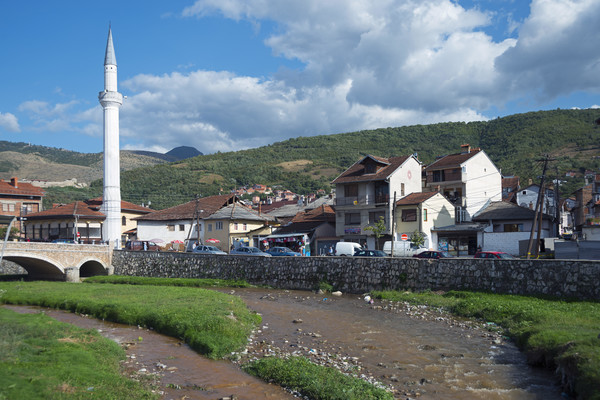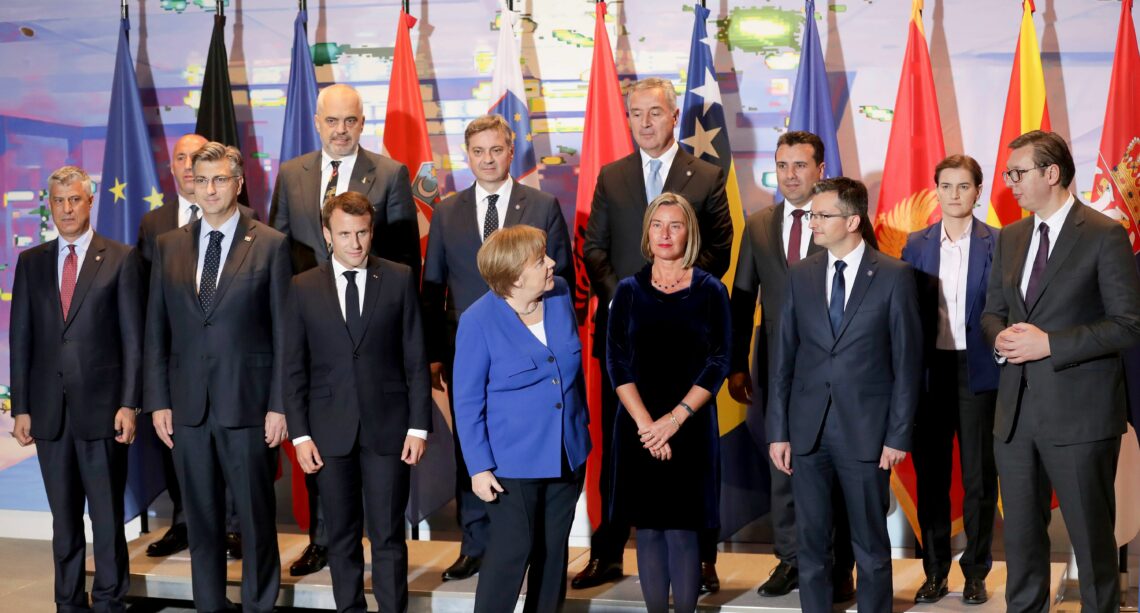An American comeback in the Balkans
The U.S. has realized that the EU alone cannot broker peace in the Western Balkans and that this power vacuum could open the door to non-EU influence. Washington is currently taking measures to ensure that key agreements are concluded before the next U.S. presidential elections, even if this involvement will cause tensions with Brussels.

In a nutshell
- The appointment of a U.S. special envoy to the Balkans marks a new era of American involvement in the region
- This comeback could lead to clashes with the EU, which aspires to be the main regional player
- An agreement between Serbia and Kosovo is likely to materialize in the months ahead
Without the hard power of the United States, the European Union’s soft approach has not proven effective in the Western Balkans. After the U.S. withdrew from the region in the early 2000s, the EU-run post-conflict transition failed to bring regional stability. This vacuum allowed other players to enter the region, and this alarmed Washington enough to prompt a return after two decades of absence.
On September 1, 2019, U.S. Secretary of State Mike Pompeo appointed Matthew Palmer as special envoy for the Balkans, sending a clear message that the EU could not be trusted to stabilize the region on its own. A few days later, U.S. President Donald Trump dismissed National Security Advisor John Bolton, who advocated a border change agreement between Kosovo and Serbia. It is worth noting that Mr. Bolton, in taking this stance, became a favorite of Serbian Foreign Minister Ivica Dacic but was in disagreement with Mr. Pompeo. The latter is scheduled to visit the Balkans in October.
The U.S. is betting on the hands-on “Richard Holbrooke” model of involvement, which ended the Yugoslav wars in the 1990s, to avoid renewed tension and state failure in the Western Balkans. As American expert Daniel Serwer pointed out, the new appointment could be interpreted as a sign that the U.S. intends to bring closure to the Balkans before the presidential election in November 2020.
The U.S. withdrawal after the war – which left the Balkans in the sole care of the EU – was a strategic mistake that opened the door to players beyond the Euro-Atlantic area. Now Washington has understood the seriousness of these consequences, and decided to return to the region to rectify the situation.
The U.S. withdrawal was a strategic mistake that opened the door to players beyond the Euro-Atlantic area.
All recent Balkan postwar agreements required active U.S. involvement. The latter led to the Dayton Accords (1995), the Rambouillet Agreement (1999) and the Ohrid Framework Agreement (2001), bringing peace to Bosnia and Herzegovina, Kosovo and Macedonia respectively. In the 2000s, regional leadership was transferred to the EU.
American absence
After the Yugoslav Wars, the EU introduced the Stabilisation and Association Process (SAP), which was established to eventually make the Western Balkan countries members of the bloc. Twenty years later, only Croatia has joined the club. Two decades ago, over 90 percent of Balkan citizens were in favor of EU integration; according to recent polls the number now sank to 56 percent. The EU repeats that it does not want to integrate countries in conflict, but the region is not ready to wait indefinitely at Brussels’ doors.
The EU dawdled with enlargement, maintaining the status quo for too long. It has now suggested two alternatives to membership. Some member states are calling for close partnership instead of enlargement, arguing that the Western Balkans are unprepared for the EU. There is also talk of granting the region a special status, potentially similar to that of Turkey. On the other hand, the president-elect of the European Commission, Ursula von der Leyen, declared she wanted the Western Balkans to “be as close to the EU as possible.”
The EU’s restrictive enlargement policy has pushed Turkey and part of the Balkans toward Russia. Now the U.S. will have to bring them back into the Euro-Atlantic sphere. Brussels’ approach was also notably asymmetric in its requests to Serbia and Kosovo during peace talks, and this imbalance is currently being rectified.
For example, on August 13 the Quint (the U.S., Germany, the United Kingdom, France and Italy) requested further negotiations to remove mutual tariffs and to lift Serbia’s diplomatic blockade against Kosovo membership in international organizations. Earlier, the EU had only requested that Kosovo withdraw its economic sanctions against Serbia, tolerating Belgrade’s refusal to impose sanctions against Russia. As an accession candidate, Serbia has to be aligned with the EU Common Foreign and Security Policy (CFSP).
Instead of falling in line with the EU’s foreign policy since 2014, Serbia announced it would join the Eurasian Union, a strategic alternative to the EU launched by Russia. Brussels only reacted in August this year, warning Belgrade that it could not belong to both unions simultaneously.
These developments raised doubts about whether or not the Belgrade-Pristina dialogue would resume. One year after the interruption in the Pristina-Belgrade negotiations (2018-2019), German Chancellor Angela Merkel and French President Emmanuel Macron rebooted the process this spring as a Berlin-Paris initiative. In parallel, the Quint expressed their wish to do away with the old model of facilitation, implying dissatisfaction with EU mediation.

During a meeting with Serbian President Aleksandar Vucic in August this year, U.S. Secretary of State Pompeo expressed the wish to reach a “final agreement of mutual recognition between the two states.” Local media claims that Serbia was promised $10 billion in grants and military aircraft if it recognizes Kosovo. There are also rumors that NATO will train the Kosovo Army for the retaking of North Kosovo during the Joint Reaction 2019 military exercises, which will be held in Albania on October 21-24. NATO and the U.S. have not commented on the speculations. Meanwhile, why does Serbia refuse to answer why it bought nine autonomous armed drones from China and ordered an additional 15?
It is clear that the U.S. is back in the region – not only in Kosovo and Serbia, but also in Albania and North Macedonia, where additional security challenges could develop. North Macedonian President Stevo Pendarovski has declared he expects “40 to 50 turbulent days” before the end of this year. With a political crisis between the government and the opposition, neighboring Albania fears a “hot autumn.”
U.S.-EU heat
The U.S. will stabilize the region, but this could lead to a silent diplomatic war between Washington and Brussels. To speed up the process, the U.S. special envoy will push for a more proactive approach in the dialogue between Kosovo and Serbia. Mr. Palmer stated that his main goal will be to bring both sides back to the table to find an agreement, but he will also want Albania and North Macedonia to join the EU, and Bosnia and Herzegovina to become a functional state.
This recent American shift made waves in Brussels. A European Commission spokesperson immediately stated that “the dialogue will be mediated by the EU.” German MP Peter Beyer questioned the need for Mr. Palmer’s appointment, requesting that the EU also appoint a special envoy – who would most probably be German, keeping in mind that Berlin will assume presidency of the EU Council during the second half of 2020, in addition to recently joining the UN Security Council. More U.S. involvement in the Balkans would clash with French President Emmanuel Macron’s doctrine of European sovereignty, which aims to position the EU as a player of the same geopolitical importance as the U.S., Russia, China and Turkey. Others suggested that Russia should appoint an envoy of its own.
The U.S. will stabilize the region, but this could lead to a diplomatic war between Washington and Brussels.
The negotiation process is entering its final – but hardest – phase, which will most likely include other big non-EU players to prepare the final outcome: UN membership for Kosovo and EU membership for Serbia.
This renewed American involvement may have been partially prompted by the EU’s recently appointed mediator of the Pristina-Belgrade dialogue. As of November 1, talks will be led by the new High Representative for Common Foreign and Security Policy, Josep Borell – the current minister of foreign affairs of Spain, one of the five EU countries that do not recognize the Republic of Kosovo. By contrast, the new U.S. envoy for the Western Balkans was very clear: “The U.S. would like to see mutual recognition as a central point of the agreement.”
The U.S. declared its willingness to be included in the dialogue when both states return to the table. After President Trump sent a letter to both the Kosovo and Serbian presidents, the latter speculated that Mr. Trump “will visit Serbia on August 25, 2020,” at which point the two leaders will “decide on a final agreement between Kosovo and Serbia.”
Scenarios
This American return to the region will have a big impact on U.S.-EU relations and create a new diplomatic battle for primacy in the Western Balkans. After ideological conflicts over Brexit, Russian gas, Iran and the trade dispute with China, the EU and the U.S. could clash over the Balkans as well.
To avoid Russian and Chinese penetration in the region, the U.S. will attempt to settle several issues urgently – the Kosovo-Serbia negotiations, the NATO membership of North Macedonia, the protracted political crisis in Albania and the creation of a functional state of Bosnia and Herzegovina. The American approach will no doubt be more robust than the EU’s failed handling of the situation.
From a local perspective, North Macedonia will probably become the 30th NATO member in the months to come. An agreement between Serbia and Kosovo is also likely to be reached in 2020. Kosovo will elect a parliament and government in October, while parliamentary elections will be held in Serbia in the spring. So far, no Kosovo candidates for the prime minister seat are ready to accept border changes. Washington sent a clear message to both countries: “Don’t vote for corrupt politicians” and “bring new ideas into the Kosovo-Serbia dialogue.”
Now that the U.S. is back in the Western Balkans, a final agreement could be signed in the White House before November 2020 – much like the Camp David agreement of 1978, when President Jimmy Carter ended the Egypt-Israel war.








